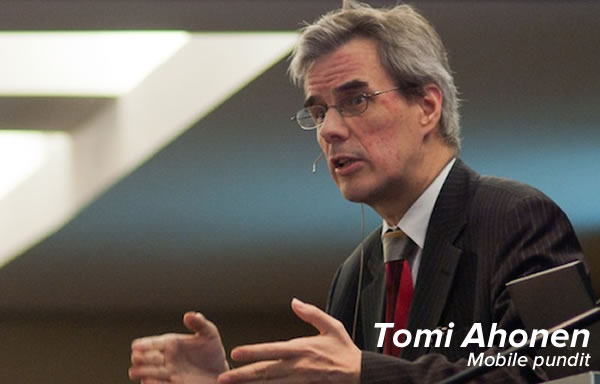
Tomi Ahonen, Nokia executive during its heyday, mobile consultant to Fortune 500 companies, prolific author, and all-round mobile curmudgeon, has published his predictions for the mobile handset industry in 2015 on his blog, Communities Dominate Brands. The title of his article, So the Smartphone ‘Bloodbath’ Annual Preview for Year 2015 – This is so boring, gives you a taste of his writing style: a little hyperbole, and a lot of stream of consciousness. It’s a big, monolithic block of text, chock-a-block with the asides that are his stock in trade, and it’s a lot to wade through.
We’ve taken Ahonen’s article and distilled it for what we think are the big take-aways from his 2015 predictions. As always, this sort of future-telling should always be taken with a grain of salt — while he often has brilliant insights into mobile tech (it’s why we read what he has to say), he’s been known to be oh-so-very-wrong from time to time (as everyone is).
Samsung
Samsung’s sitting pretty as the world’s largest handset maker, at almost twice the size of the next runner-up, and larger than the 2nd- and 3rd-place vendors combined. They’re also the largest of the “major handset makers who genuinely cater to the global mass market” (as opposed to Apple, who are aimed at the higher-end customer, or BlackBerry, whose focus is the enterprise). Their “everywhere” status means that they’ll make good money and stable, but it also means that investors can’t count on them to be as “ridiculously profitable” as Apple.
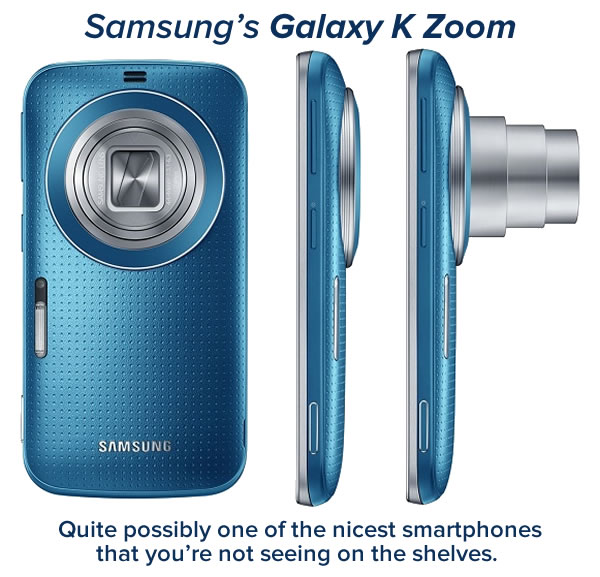
Samsung’s weakness, according to Ahonen, is their sales management, which he describes as “a total disaster”. They produce a confusing array of all-too-similar models, and fail to highlight interesting and innovative devices like the Galaxy K Zoom, which reimagines the smartphone as a camera with a great lens and 10x optical zoom that just happens to have a phone rather than the other way around, priced 20% below the latest iPhone model. Given that:
- most people’s phones are their cameras these days,
- we can’t post enough photos on Facebook, Twitter, Instagram, and SnapChat, and
- camera quality is a big factor in many people’s smartphone choices,
you’d think that this would be a heavily-marketed, big-selling Android phone. But just try to find it at your local store.
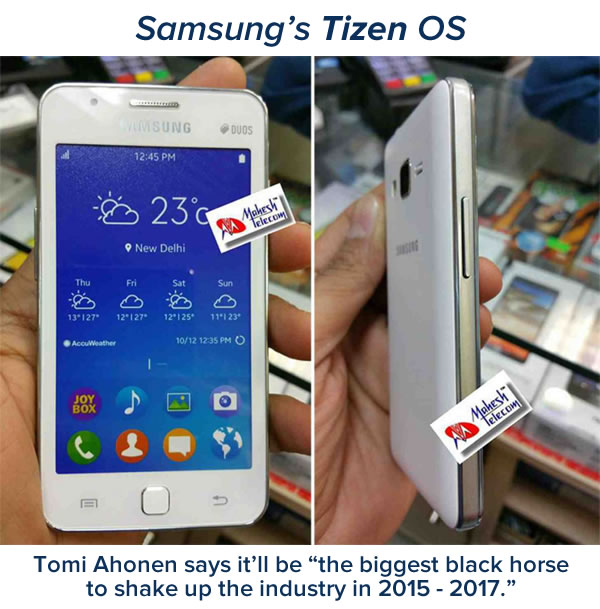
Tizen, Samsung’s troubled, often–delayed device operating system that they they hope will free them from dependency on Google and Android, is expected to debut at this year’s CES, where it’ll debut on its TV sets. While the Tizen Alliance — a rag-tag group of a dozen hardware manufacturers who’ve promised to release Tizen-powered devices — seens to have fizzled out, Ahonen still believes that Samsung’s market size and clout, combined with the sort of effort and execution Samsung can make when they’re doing things right, mean that Tizen could be a game-changer over the next couple of years.
Apple
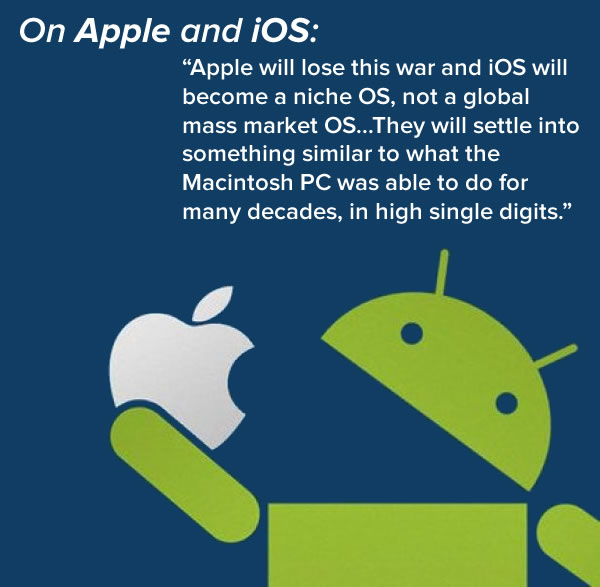
Apple has historically been one of Ahonen’s blind spots. Back when Nokia, Motorola, RIM, and Palm were the ones to beat, he consistently downplayed Apple. Later, as Nokia was going down in flames, his thesis was that the iPhone didn’t kill Nokia, Nokia’s response to the iPhone did.

Ahonen’s prediction that we should start to see the final transformation of Apple into a niche OS and out of the mass market as Android assumes the position for mobile devices that Windows had for desktop computers. As for the Apple Watch, he says that yes, the iFaithful will line up to buy it, but in the end, even they will reject it in the long run.
Lenovo

They did well for themselves in the laptop world by buying an internationally-recognized and respected brand — IBM’s ThinkPad — and turning it into a profitable business. It appears that they’re trying to repeat history now that they own the Motorola marque. Buying these brands are smart moves, says Ahonen, allowing them to sidestep the reputation of “cheap Chinese” that other vendors like Huawei and ZTE have to contend with, especially given the rave reviews their most recent phones have received. Moto, and not Xiaomi, is the biggest threat to Samsung, according to Ahonen.

Here’s the Ahonen take in a single sentence: They won, and the only way they can lose is if they themselves screw it up.
The “Next Five” (Coolpad, Huawei, TCL, Xiaomi, ZTE)
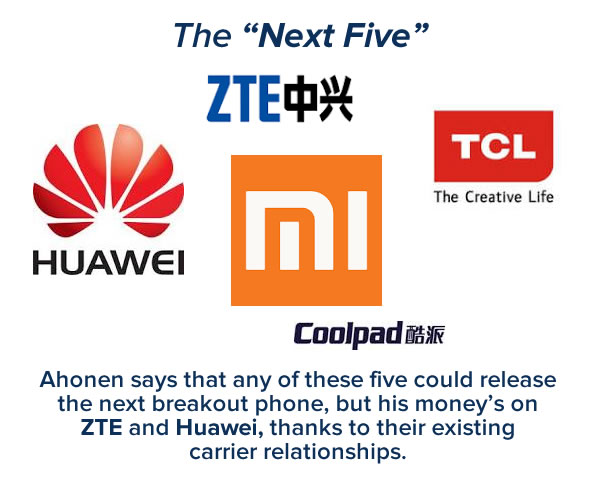
Here in the U.S., none of these brands — Coolpad, Huawei (“WAH-way”), TCL, Xiaome (“SHOW-mee”, the first syllable rhymes with “cow”), and ZTE — are household names, but in Ahonen’s list, they’re the next runners-up after the top three smartphone vendors (Xiaomi recently moved up to the number 3 position). Xiaomi is getting a lot of press right now, partly because of its dramatic growth, and partly because they’re hardcore Apple copycats.
If he had to bet on members of the “next five”, Ahonen would put his money on Huawei and ZTE, because selling phones requires more than product, but also relationships with carriers worldwide. Huawei and ZTE have been selling telecom equipment to the carriers for years, so they have an “in” that upstarts like Xiaomi don’t.
Legacy brands (such as HTC, LG, and Sony)

Ahonen doesn’t see these vendors — HTC, LG, and Sony — making much of a mark. He says that while they may see the occasional quarter where they see “record profits” (or have moments in the sun, as LG seems to be having with well-reviewed phones like their G3), these will be fleeting moments followed by “obsolescent models are overflowing in the showrooms then there are returns to the factory and suddenly huge losses generated”. “The brand and sales channel,” he argues, “is of far more value to one of the rising stars (mostly from China) who want to take over the world than to a legacy manufacturer who suddenly sees big losses.”
BlackBerry

“One of the saddest stories in tech,” says Ahonen. He says that the Passport and Classic missed the mark, and that while they may find a home catering to the enterprise, either as a hardware vendor or as a pure software play, they’ll never return back to the top 10. They’re even slipping out of the top 20 right now.
Microsoft (the company formerly known as Nokia)

Just as he has a bit of a blind spot for Apple, Ahonen has a sore spot about Windows Phone. He can’t talk about it without seething with rage, and especially at the Microsoft exec-turned Nokia CEO-turned Microsoft exec Stephen Elop. We’ll condense his four paragraphs on this topic to:
- They’re soooo dead. We still have no idea why 1/3 of Lumia phones haven’t been activated!
- Microsoft can’t kill off their smartphone business now. The best thing they can do is fire the current Windows Phone executive VP of Devices and Services (Elop) and let some hapless, well-intentioned patsy run it into the ground.
- Expect them to ditch the phone hardware division sometime in the next three years.
The other mobile OSs
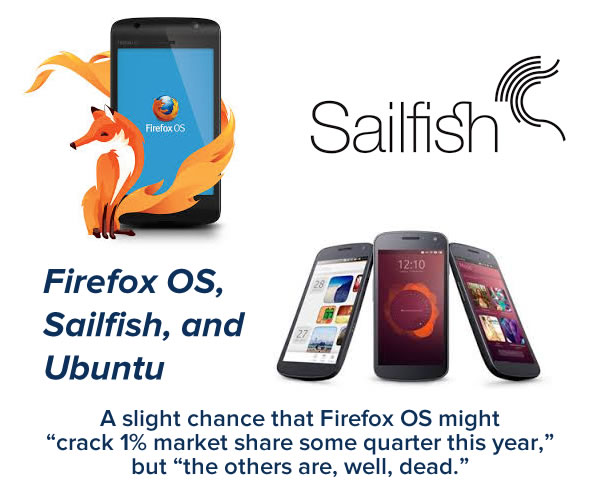
The short version: They don’t stand a chance.
The Company still known as Nokia
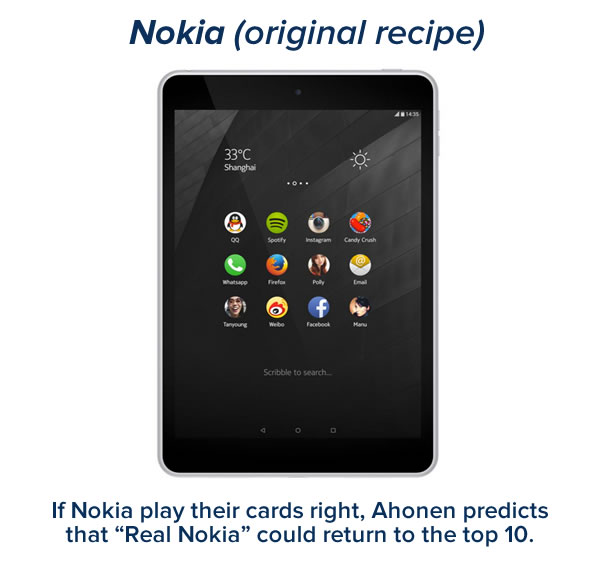
Microsoft may have bought Nokia’s handset business, but they didn’t buy the entire company. There’s still a company called Nokia that makes networking equipment for carriers, mobile mapping and navigation technologies, and even mobile devices. Right now, they’re contractually forbidden from making smartphones under their own brand for another year or so, but they’ve put out a well-reviewed tablet. Ahonen believes that with their relationships with carriers and the right execution, Nokia could make an Android-powered comeback. As a bonus, he follows this with a (long, so very, very long) “Hollywood scenario” in which Nokia’s ability to turn dying businesses around (as they did with Siemens’ telecom and Motorola’s networking divisions) and the brand loyalty they’ve earned worldwide make it surpass Apple and become Samsung’s biggest rival. It reads like fan fiction, and even he admits that it’s a very unlikely scenario.

2 replies on “Mobile pundit Tomi Ahonen’s predictions for smartphone vendors in 2015”
It’s interesting to see these evaluations of various smartphones. I myself got a new LG G3 in July and am very happy with it. But the article makes me curious about what new developments in technology will do to these companies. Who is likely to be left behind with the next advances?
Very interesting predictions – thank you! I love the new Samsung Zoom – the look and feel and I believe the quality will be great as well. Will certainly wish to buy such smartphone. The new Nokia looks not bad too, but nthing revolutionary, as it used to be